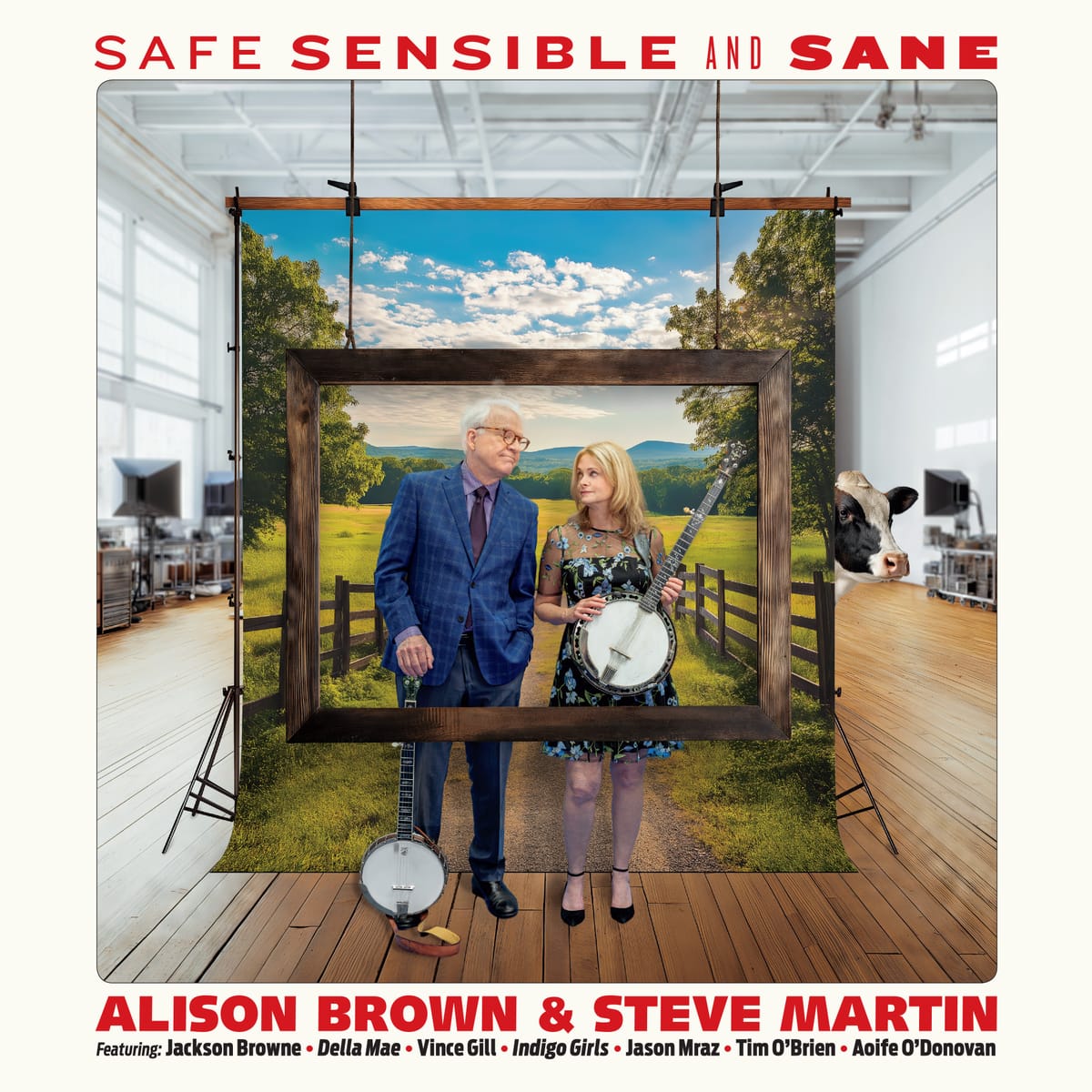“Two banjos can be a cry for help,” says bluegrass musician and banjo player Alison Brown, with a laugh. Indeed, even one banjo in American music is frequently written as a showoff or brash counterpart; and in the rare instance that two appear, they’re often pitted against each other (perhaps most famously in Arthur Smith’s “Dueling Banjos” as popularized by Earl Scruggs and Eric Weisberg and Steve Mandell). To put two banjos in conversation with each other instead, requires an inquisitive, intuitive approach and a gentle touch. Brown strikes that balance on her latest album, a set of duets with comedian and fellow banjo player, Steve Martin.
On Safe, Sensible and Sane, released October 17, Brown’s meticulous, seemingly effortless three finger picking weaves in and out of Martin’s percussive, jubilant clawhammer strumming, like exuberant chatter between old friends. The pair first collaborated on “Foggy Morning Breaking” for Brown’s latest solo album, On Banjo (2023). After sharing tunes and ideas back and forth, they decided to record a full album. Though both play banjo on the album, it’s not a banjo album, per se, Martin says. More so, the album is based in the banjo’s melodic potential, Brown clarifies.
“There is something instantly evocative about it,” Martin says. “I have an affection for Irish, Scottish, English music, folk music; I have an affection for Appalachian music. I don't know why. I think there's something melancholy in the notes, that lives inside those notes, and it's our job to release them.”
As co-writers, Brown and Martin display an exquisite knack for illuminating the relatability and joy in everyday life experiences: “A summer elation it’s like we had wings / It’s so therapeutic for us to remember / The joy that a sliver of happiness brings,” read the lyrics for “Michael,” a song about the quiet bliss of old friendships and an entire day spent in light spirits, sung by guest vocalist Aiofe O’Donovan. Later in the album, Brown and Martin dispense sage wisdom with “Girl, Have Money When You’re Old” — “have money when you’re through / just enough to say ‘screw you’” — sung by Amy Ray and Emily Sailers of the Indigo Girls.
Whimsey, too, takes center stage on the album, a natural fit for Martin’s comedy acumen and the banjo’s plucky disposition. Tongue firmly in cheek, on one of his two vocal tracks on the album, Martin imagines the grandeur of hitting No. 1 on “Bluegrass Radio,” declaring with facetious bravado: “Paul McCartney you can stand aside” and “Now that I’m a winner / I have Chick Fil-A for dinner”; and on his other vocal track, bloviates as a scorned husband with new lyrics he wrote for the traditional tune, “Cluck Old Hen.” The album’s title too, is a lyric from the self-described nonsense song, “Statement Of Your Affairs,” a bright, sunny number featuring Jason Mraz on vocals, and concocted from lines Martin found in a 1930s book about writing better letters.
Two Styles; Many Voices
Brown and Martin (both Grammy and IBMA-award winning musicians) met a few years ago, while each was independently on vacation in the Caribbean. During their first jam session, their two banjo playing styles together complimented each other, a moment that was “musically satisfying” kismet, Brown says.
“One of my favorite things for a long time has been the sound of clawhammer banjo and three finger banjo together. Going back to the Circles album, when John McEwen and Earl Scruggs did “Soldier's Joy,” Brown says. “It was just beautiful; it was a sound that I've been thinking about since I was a teenager.”
On that album, 1972’s Will The Circle Be Unbroken, Earl Scruggs (who, along with Lester Flatt is widely regarded as the grandfather of bluegrass music as it’s played today) joined folk rock innovators, the Nitty Gritty Dirt Band for a monumental double album of folk and country classics. In addition to many heavy hitting collaborations, including from Mother Maybelle Carter, Doc Watson, and Roy Acuff, Dirt Band member John McEwen and Scruggs performed the traditional tune “Soldier’s Joy” as a two-banjo duet. The album was a watershed moment of musical connection and a passing of the torch in many ways.
The banjo has faded in and out of fashion and visibility in American folk music since arriving with African slaves: It’s been a centerpiece of various folk movements, sometimes disregarded as a hillbilly instrument, and its history whitewashed.
More recently though, the banjo seems to be everywhere — played by Rhiannon Giddens Beyoncé’s Cowboy Carter and even strummed by Martin in a new Aerosmith/YUNGBLUD single, “My Only Angel (Desert Road Version).” The instrument compels, as it always has, gathering and kinship. To that end, Brown and Martin assembled an impressive slate of collaborators including O’Donovan, The Indigo Girls, Mraz, Jackson Browne, Vince Gill, Della Mae, and Tim O’Brian.
Together, they treat happiness, self-worth, and a well-lived life with the gravity usually reserved for heartache (though there’s some of that too, of course). They eschew didactic statements in favor of a set of reflections like those passed around a cozy living room jam session. “I think you have to be a pretty wise person to make statements, because you can get so wiped out by anger and hatred,” Martin says. “As our nature, it wasn't a choice, we just stayed within our [wheelhouse]: romance, separation, humor, joy of being with other people.”
Still, the album is not without its lessons. One of its most poignant moments comes early on, with “5 Days Out, 2 Days Back,” as a musician father negotiates with his daughter, who begs him to stay home more. And on the album’s emotional heart, “Dear Time,” featuring Jackson Browne delivering a tender thank you letter to life’s magic and the ineffable joy of being alive. It’s hard not to hear it from the perspective of Martin, who just turned 80:
Look what I’ve collected
A little box of memories
Somewhat disconnected
Tied with twine
Could I trade them in for
A visit with my mom and dad
Or throw the ball with my old dog
One more time
…
Dear Time
On this fair occasion
I’d like to say you’ve given me
More than what you’ve taken
Composed of sweet, unglamorous moments, collected and savored, both song and album are eloquent for their simplicity and a welcome respite from the maelstrom of the world. As the banjo enjoys more popularity, Brown hopes the album will continue to raise the instrument’s profile as versatile and lyrical.
“You can find the banjo in a lot more places now, a lot of different genres, and it's getting a broader acceptance, but there's still a chunk of people who really still associate it with Hee Haw or whatever,” she says. “I hope that people listening to this music will be like, ‘Oh, it is a legitimate musical instrument, it's not a novelty instrument; it's capable of so much beauty.’”





Comments ()